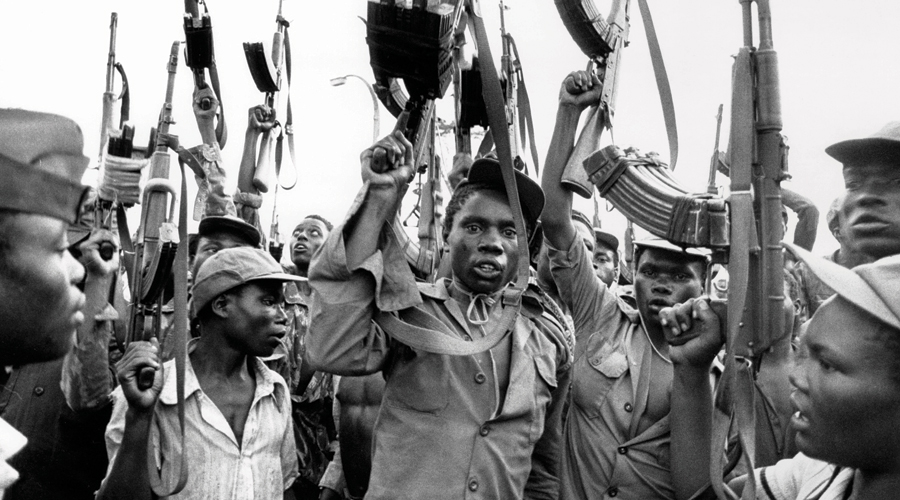The Mozambican Civil War was a 15-year conflict that occurred between May 30, 1977 and October 4, 1992 in the southern African country of Mozambique. Although ostensibly an internal civil war, the conflict was in fact a proxy war between the Soviet Union which backed the Mozambican government and the United States which supported the insurgents. The war occurred two years after Mozambique officially gained its independence from Portugal. The main belligerents were the Mozambique Liberation Front (FRELIMO) led by President Samora Machel which controlled the central government and the Mozambican National Resistance (RENAMO) led by André Matsangaissa. It was estimated that one million people died during a 15-year conflict in a country which in 1990 had a population of 14 million.
The background of the war goes back to 1976 when troops from white minority-controlled Rhodesia entered Mozambique to carry out operations against the Zimbabwe African National Liberation Army (ZANLA) which had bases in Mozambican territory. The Rhodesian troops freed André Matsangaissa, an ex-FRELIMO official who had been arrested and imprisoned. Matsangaissa joined RENAMO which was formed in 1975 in opposition to FRELIMO and quickly rose to become its leader. When Matsangaissa was killed in 1979 after an unsuccessful attack on a Mozambican regional Centre, Afonso Dhlakama became the new leader of RENAMO.
FRELIMO was strongest in the cities and major towns of Mozambique during much of the civil war while RENAMO operated mainly in the countryside. It continued the fight against the Mozambique central government even after the white minority regime in Rhodesia was replaced by Robert Mugabe who renamed the country Zimbabwe. Mugabe and his government now supported FRELIMO but RENAMO gained the support of Kenya and South Africa.
RENAMO carried out raids on towns and occasionally smaller cities. To gain more troops it recruited civilians into its army—including child solders—after mass abductions. RENAMO also had imposed a system it called Gamdira whereby villagers were required to produce food, transport goods and ammunition, and village women were forced to be sex slaves.
As the war continued both sides began using brutal tactics including land mines. RENAMO however attempted to stall the economy and destroy confidence in the central government by mining roads, schools, and health centers.
The war continued into the 1980s with FRELIMO losing most of Mozambique’s territory although keeping control in the urban areas. FRELIMO got support and aid from the Soviet Union, France, and the United Kingdom while RENAMO got its aid from South Africa, Kenya, and covertly from the United States.
On October 19, 1986, President Samora Machel died when his plane crashed near South Africa’s border. It was unclear how and why the plane crashed or whether RENAMO or even South Africa was responsible. Joaquim Alberto Chissano succeeded Machel as president of the country where, because of the nine-year conflict, hundreds of thousands of Mozambicans were dying from famine which was caused by both FRELIMO and RENAMO.
By 1990 neither side seemed to be winning the war. Developments outside Mozambique, however, would soon bring an end to the fighting. By 1990 South Africa was moving toward a black majority-controlled nation and the Soviet Union had fallen. FRELIMO and RENAMO were losing their major supporters and arms suppliers. In 1990, Mozambique adopted a new constitution that included multiparty elections. In 1992, a peace accord was signed in Rome, Italy which allowed UN peacekeepers to enter the country. Their presence effectively ended the war. In 1994, the first free elections were held in the country. Despite FRELIMO winning the majority, a portion of the population voted for RENAMO candidates. The political rivalry continues but the military conflict is over.

